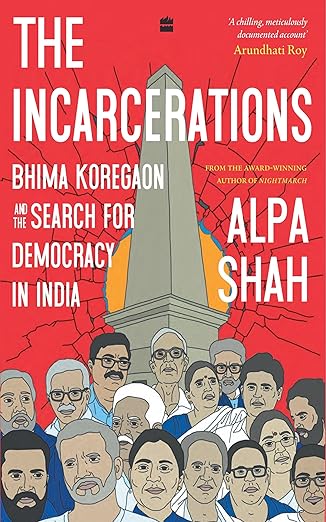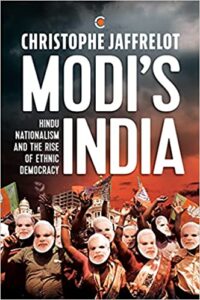The Incarcerations shows how outdated the established narrative about India has become… Shah convincingly argues that key material in the prosecution cases against the sixteen activists… were fabrications planted by the Indian police on the computers of some of the accused. — Literary Review
Why I Picked the Book
The first day of 2018 began with violence in Bhima Koregaon. Every year, on January 1st, people from across Maharashtra gather to pay tribute at a war memorial commemorating the historic 1818 battle. This year marked the 200th anniversary of that battle, in which a British regiment comprising Dalit soldiers defeated the upper-caste Peshwa forces. For many in the upper-caste communities, this commemoration has long been a sore point. But in 2018, the event took a disturbing turn when upper-caste Hindutva groups with apparent political backing violently disrupted it.
Initially, police filed charges against two Hindutva leaders accused of inciting the violence. However, within a few months, the narrative shifted dramatically. Authorities instead targeted sixteen lawyers, activists, and academics—many of whom weren’t even from Maharashtra—who had been vocal in their support for Dalit rights. I was following the case closely, and to learn more about it, I decided to read this book.
What is in the book
The Incarcerations by Alpa Shah offers a detailed and deeply researched account of the Bhima Koregaon incident of 2018. She explores various aspects of the Bhima Koregaon case in depth. She examines the historical significance of Bhima-Koregaon, what happened on 1st January 2018 in Bhima Koregaon, and how things unfolded after that. Further, she gives us a glimpse of the lives of BK16 (sixteen people arrested in the Bhima Koregaon case), what they do, and how they were falsely implicated. She digs deep into the investigation process to find out how the government used the state and non-state machinery to falsely implicate the BK16. The author also highlights how the government and its underlying ideology are posing a threat to democracy in India.
Knowing the BK16
The author provides a vivid character sketch of the BK16 accused. While reading about them, I felt gratitude and a profound sense of respect for everything they are doing for the country. BK16 consists of wide range of individuals, including lawyers and academics like Sudha Bhardwaj, Hany Babu, and Anand Teltumbde – Artists such as Jyoti Jagtap, Sagar Gorkhe, and Ramesh Gaichor of the Kabir Kala Manch – Activists and writers including Gautam Navlakha, Varavara Rao, and Father Stan Swamy. Reading and knowing about each one was an enriching experience for me, and I am sure it will inspire the readers as well. They stand in solidarity with the most marginalized in India—Tribals, Dalits, and others who continue to face neglect and injustice from the state.
A Brief History of Bhima Koregaon
The Incarcerations explains the historical significance of annual Bhima Koregaon victory celebrations and the cause of conflict and violence around it. This will give the readers a context to understand why the violence happened in January 2018. As I turned the pages, I came to know that at the core of it is the caste system and the hegemony of the upper caste. The author provides a chronology of events, the violence, the prequel to violence, and the charge sheet filed by the police immediately after the violence. It helps readers understand how the event unfolded and how the investigation and actions initially taken by the Pune police were later overturned.
Conspiracy to implicate BK16
The book documents how the initial investigation was dumped, and fresh charges were filed against BK16 to implicate them in the Bhima Koregaon violence. They were charged with a conspiracy to assassinate the PM and were booked under the UAPA – Unlawful Activities (Prevention) Act. The author has undertaken extensive research to uncover the truth. Shah presents a detailed account of how false evidence was planted on the laptops and phones of some of the activists. She explains how the government allegedly used NetWire, a type of malware, to infiltrate their devices and insert incriminating documents. To support these claims, the author consulted cybersecurity firm SentinelOne and forensic experts at Arsenal Consulting, and she shares their chilling findings. Reading about this left me deeply unsettled—the scale of resources and effort a state can mobilize to fabricate a case against its citizens is truly alarming.
My Experience
Reading this book was a truly eye-opening experience. Although I had some prior knowledge of the Bhima Koregaon incident and its historical context, this book offered a powerful and revelatory perspective. The book delves into a comprehensive account of the 2018 events, shedding light on how the government allegedly manipulated the situation to target the BK16.
Filled with facts and insights, The Incarcerations reveals how a simple commemorative gathering was reframed as a national security threat. It offers a chilling look into the state’s apparent obsession with suppressing dissent—and the disturbing lengths it is willing to go to achieve that.
My Recommendation
“The Incarcerations” is an essential read. It cuts through the media fog surrounding the Bhima Koregaon case and exposes the unsettling truth behind it.


